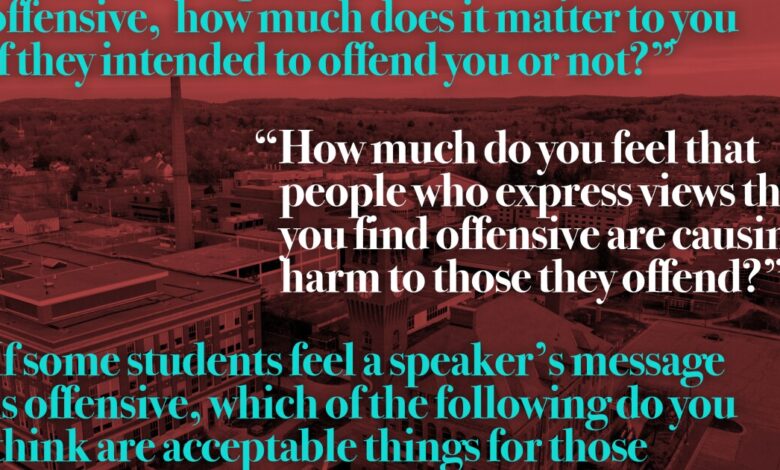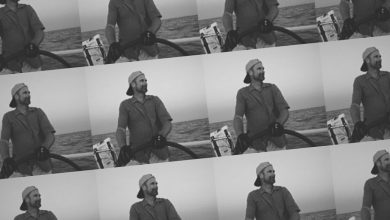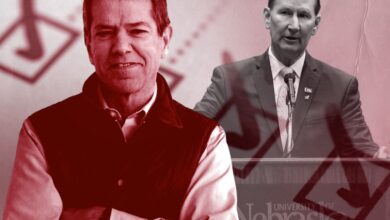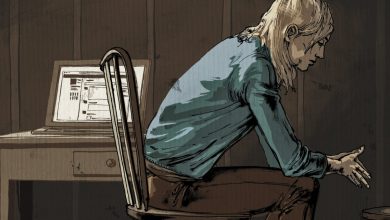A Free-Speech Survey in Wisconsin Was Delayed After a Chancellor Resigned. Now It’s Going Ahead.

The University of Wisconsin system on Monday will release a free-speech survey that was delayed last spring over political and procedural concerns.
The survey, like similar ones that have been administered in Florida and North Carolina, will ask thousands of students across the system’s 13 campuses for their perspectives on “campus free expression, viewpoint diversity, and self-censorship,” according to its description. Originally scheduled for April, the survey was quickly walked back after some campus leaders expressed worry about its subject matter, and after the interim chancellor of one of the system’s campuses resigned in protest.
The survey’s subject matter, and concerns that its results could be misused by Republican legislators, prompted multiple student-government leaders in the system, and the state chapter of the American Association of University Professors, to call for its delay or cancellation. Chronicle reporting in the spring indicated the survey may not have been approved by institutional review boards on all of the system’s campuses. And James P. Henderson, in a remarkable show of dissent from system leadership, cited the handling of the survey as a major reason for his sudden resignation as interim chancellor of the Whitewater campus, saying he and his fellow chancellors had not been given adequate input into it.
The survey has evolved since the controversies of the spring, Jay O. Rothman, president of the system, said in an interview with The Chronicle on Friday. Rothman, who took office on June 1, said he fully supported the survey and “the opportunities around freedom of expression and civil dialogue are one of the reasons I took this job.” The survey, he added, incorporates feedback from campus chancellors, shared-governance leaders, and an advisory board.
The survey will provide system leaders with statistically reliable information about what’s happening on its campuses, Rothman said. “We are trying to learn,” he said. “We want to know what the climate is, and then we can react to, What are some things that we can do to enhance the climate?”
Rothman on Friday announced several other projects aimed at promoting civil dialogue, including the creation of the Wisconsin Institute for Citizenship and Civil Dialogue, which will coordinate efforts and may offer joint programs among research and policy centers across the system to bolster civil dialogue. The system will also convene a series of “peer-to-peer conversations on challenging topics,” in which Rothman will participate, and will sponsor the Wisconsin Civic Games for middle- and high-school students.
Little Evidence
The Wisconsin survey will join similar efforts in Florida and North Carolina to gauge students’ views on free speech and other hot-button topics. Florida last year enacted a law requiring an annual survey of public-university students and employees to assess the climate of intellectual diversity on their campuses. Only 2.4 percent of the more than 364,000 students who were sent the survey in April filled it out, however, and the response rate among faculty and staff members was 9.4 percent.
United Faculty of Florida, the union representing professors, had encouraged students, instructors, and staff members to ignore the survey, saying it was not being administered in good faith and constituted an attempt by Republican legislators to bolster the claim that conservative students feel unwelcome in college classrooms. (A Republican state representative who sponsored the law mandating the survey told the Tallahassee Democrat that he had done so to allow future legislatures to “use that data as the basis to make a policy decision.”)
A free-expression survey circulated to students in the University of North Carolina system last spring yielded a slightly more robust response, with 7.9 percent of students completing it. In that survey, researchers found “little evidence that faculty create a highly politicized atmosphere in UNC system classrooms.” They also found that most students’ ideological views hadn’t changed during their time in college. Respondents, particularly those who identified as conservative, were more likely to self-censor due to concern about how their peers would react than how their professors would.
The questions in both surveys are similar to those that will appear in Wisconsin. Students will be asked whether they have felt pressured by professors to agree with a specific political or ideological opinion discussed in class; how open they are to considering viewpoints that differ from their own on subjects like abortion, gun control, immigration, police misconduct, and transgender issues; and whether controversial speakers on campus should be disinvited or protested against.
The survey also will pose hypothetical scenarios — for example, an instructor criticizing an elected official on a personal Twitter account, or a group of students posting on social media that a student of a certain race or ethnicity isn’t welcome on campus — and ask whether students believe those scenarios would be protected under the First Amendment. Respondents will be asked what political party and ideologies they most identify with, though the survey notes that “you are not required to respond to any question you would rather not answer.”
The survey will be conducted by the Wisconsin Institute for Public Policy and Service, a unit of the system, and the research team consists of four professors in the system. It will be sent to a random sample of students on each campus, with the goal of yielding about 500 responses per campus, and those who complete it will each receive a $10 electronic gift card. It will close on December 14, and results are slated to be reported early next year. A system spokesperson said that the data may be weighted based on response rates.
Political Ties
Funding for the survey comes from the Menard Center for the Study of Institutions and Innovation, and its political ties were a concern for some critics. While nonpartisan, the center is named for the Menard family, owners of the home-improvement store chain Menards, who donated $2.36 million in 2019 to expand it; John R. Menard Jr., the founder of Menards, has a long record of donating to conservative political candidates and organizations. And the Menard Center, which is based on the system’s Stout campus, was founded in 2017 with a donation from the Charles Koch Foundation.
Even before it was officially delayed, the Wisconsin survey had come in for questioning, according to emails, text messages, and other materials obtained by The Chronicle through open-records requests. After being proposed in January, it was called off and restarted once, in March, because of chancellors’ objections. “Nobody is interested in doing this,” Rebecca M. Blank, then chancellor of the system’s flagship Madison campus, wrote to colleagues at the time. “So we’re off the hook on this.”
But a day later, in the same email chain, Blank wrote that careful study of free-speech issues was warranted. “I do think we will be under some pressure … from System, from the Legislature, etc. … to be able to say we are DOING SOMETHING on this topic,” she wrote. “So being proactive in this is important. Far better that we have some plans in place than that we have to scramble and create something later this coming fall.”
Blank may have been relieved to be “off the hook,” but other major stakeholders weren’t pleased with what at the time seemed to be the project’s cancellation. The director of the Menard Center, Timothy Shiell, who described himself to The Chronicle in the spring as “a liberal professor being funded by a conservative donor to run a nonpartisan center,” ascribed the decision to political optics in an email to a colleague. “By all appearances,” wrote Shiell, a professor of philosophy on the Stout campus, “the chancellors feared the results would be bad and the Legislature would pounce on it. God forbid we permit routine research on an issue of state, national, and even international importance.”
Shiell said in an April interview with The Chronicle that he had wanted to collect data on students’ views of free speech for several years. While there’s no evidence that politicians were involved in the survey’s conception, Republican leaders in the state government took great interest in its fate and progress. Among them was State Rep. Dave Murphy, who is chair of the Assembly’s Committee on Colleges and Universities. Murphy wrote in an email to Michael J. Falbo, who served as interim president from March to the beginning of Rothman’s term, on June 1, that he was “deeply disturbed” by news that the survey was being canceled. “The members of my committee,” Murphy added, “would find the results of such a survey invaluable.”
Murphy sent that email on March 30, and he copied Robin J. Vos, the powerful Republican speaker of the Wisconsin State Assembly. Emails obtained by The Chronicle indicate that Murphy and Vos, along with a Republican state senator and two system regents, contacted Falbo to ask that he reconsider his decision.
The next day, Falbo sent a copy of the planned survey to the chancellors, noting that he didn’t “find anything objectionable” in it, and met with them via Microsoft Teams to discuss it. Later that evening, the survey’s advisory board got emails saying the project was back on. (An attempt to contact Falbo on Friday was not immediately successful.)
That didn’t sit well with Henderson, the Whitewater chancellor, who handed in his resignation on April 3. During the meeting between Falbo and the chancellors, “the overwhelming response was negative,” Henderson wrote to Edmund Manydeeds III, president of the system’s Board of Regents. At the end of the meeting, Henderson wrote, Falbo “dismissed our comments and said he was proceeding. And then a pandering email came out stating system support for the survey.”
In a text to Renée M. Wachter, chancellor of the Superior campus, the day after his resignation, Henderson wrote: “I just was blown away when Mike told me we would be ‘ordered’ to administer that survey,” referring to Falbo. Wachter responded sympathetically, deeming the survey “a no-win situation.” Henderson lamented that people at the system level were “trying to force a political position on the campuses.”
On April 7 the system announced it would delay the survey a second time, after days of internal deliberations among members of the research team. In one such message, on April 5, Geoffrey Peterson, a professor of political science on the Eau Claire campus, said the survey had become a “political football,” and advocated for a pause. “The perception that members of the Legislature strong-armed the system into distributing the survey, whether accurate or not, now defines the survey and clearly implies the survey is a partisan instrument,” Peterson wrote. “The truth is, the content of the survey is, for all intents and purposes, now irrelevant. What matters now is the perceptions that are rapidly forming about it, and those perceptions are diametrically opposed to the actual goals of the survey.”
April Blesche-Rechek, a professor of psychology at Eau Claire and a member of the research team, suggested in the same email thread that concerns about campuses engaging in political indoctrination could be overblown. “Plenty of parents worry that their college kids are pressured to conform to a radical left ideological viewpoint. The frequency with which this actually is felt by students to occur, as well as the contexts in which it occurs if it ever does, may prove those assumptions wrong,” she wrote.
For his part, Rothman on Friday said the only contact he’d had with state legislators about the survey was to inform them, at the start of his tenure, that the system would move forward with it.
“The survey results will tell us one thing, but if we can’t have open and honest and fair discussions about really difficult issues — whether that’s religion, whether that’s abortion, whatever it happens to be — that’s a real challenge to our democracy,” Rothman said. “If the universities can’t be models of that, I’m not sure who’s going to be.”
Source link






